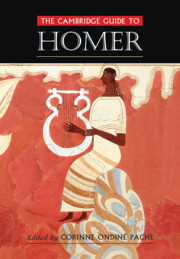Book contents
- The Cambridge Guide to Homer
- The Cambridge Guide to Homer
- Copyright page
- Contents
- Figures
- Notes on the Contributors
- General Introduction
- Part I Homeric Song and Text
- Part II Homeric World
- Introduction
- Homeric Communities
- Homeric Religion
- Homer and History
- Homeric Geography
- Homeric Materiality
- Key Topics
- Afterlife in Homer
- Assemblies and Councils
- Athletic Competition
- Basileus and Anax in Homer and Mycenaean Greek Texts
- Blegen, Carl
- Boars’ Tusk Helmets
- Burial Practices
- Catalogue of Ships: Archaeology
- Catalogue of Ships: Literary Aspects
- Class Relations
- The Literary Tradition of Destruction of Cities
- Divine Epiphany in Homer
- Family and Marriage in Homer
- Feasting and Drinking in Homer
- Archaeology of Hero Cults
- Hittite Literary Evidence
- Homeric Archaeology
- Homeric Economy
- Household Organization
- Lefkandi
- Mycenae
- Nestor’s Cup
- Nostoi
- Offerings in Homer
- Personification in Homer
- Prayers and Vows
- Pylos
- Religious Festivals in Homer
- Schliemann, Heinrich
- Shield of Achilles
- Slavery in Homer and Hesiod
- Supplication in Homer
- Troy and Its Treasures
- Warfare in Homer
- Warrior Graves
- Weapons and Armor
- Women in Homer
- Part III Homer in the World
- Bibliography
- Index
Slavery in Homer and Hesiod
from Key Topics
Published online by Cambridge University Press: 22 February 2020
- The Cambridge Guide to Homer
- The Cambridge Guide to Homer
- Copyright page
- Contents
- Figures
- Notes on the Contributors
- General Introduction
- Part I Homeric Song and Text
- Part II Homeric World
- Introduction
- Homeric Communities
- Homeric Religion
- Homer and History
- Homeric Geography
- Homeric Materiality
- Key Topics
- Afterlife in Homer
- Assemblies and Councils
- Athletic Competition
- Basileus and Anax in Homer and Mycenaean Greek Texts
- Blegen, Carl
- Boars’ Tusk Helmets
- Burial Practices
- Catalogue of Ships: Archaeology
- Catalogue of Ships: Literary Aspects
- Class Relations
- The Literary Tradition of Destruction of Cities
- Divine Epiphany in Homer
- Family and Marriage in Homer
- Feasting and Drinking in Homer
- Archaeology of Hero Cults
- Hittite Literary Evidence
- Homeric Archaeology
- Homeric Economy
- Household Organization
- Lefkandi
- Mycenae
- Nestor’s Cup
- Nostoi
- Offerings in Homer
- Personification in Homer
- Prayers and Vows
- Pylos
- Religious Festivals in Homer
- Schliemann, Heinrich
- Shield of Achilles
- Slavery in Homer and Hesiod
- Supplication in Homer
- Troy and Its Treasures
- Warfare in Homer
- Warrior Graves
- Weapons and Armor
- Women in Homer
- Part III Homer in the World
- Bibliography
- Index
Summary
The heroes of the Homeric poems own many slaves, whose condition and legal status did not essentially differ from slaves in Greece during the Classical and Hellenistic periods. The labor of these slaves provided the basileis of the Iliad and Odyssey the surplus they needed to maintain their leading position in society.
- Type
- Chapter
- Information
- The Cambridge Guide to Homer , pp. 387 - 389Publisher: Cambridge University PressPrint publication year: 2020

